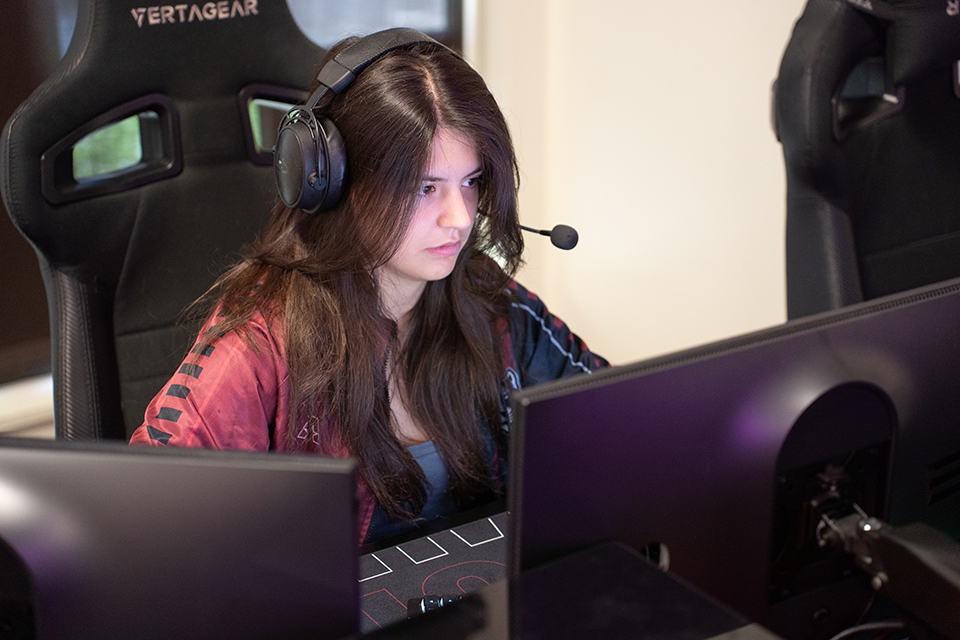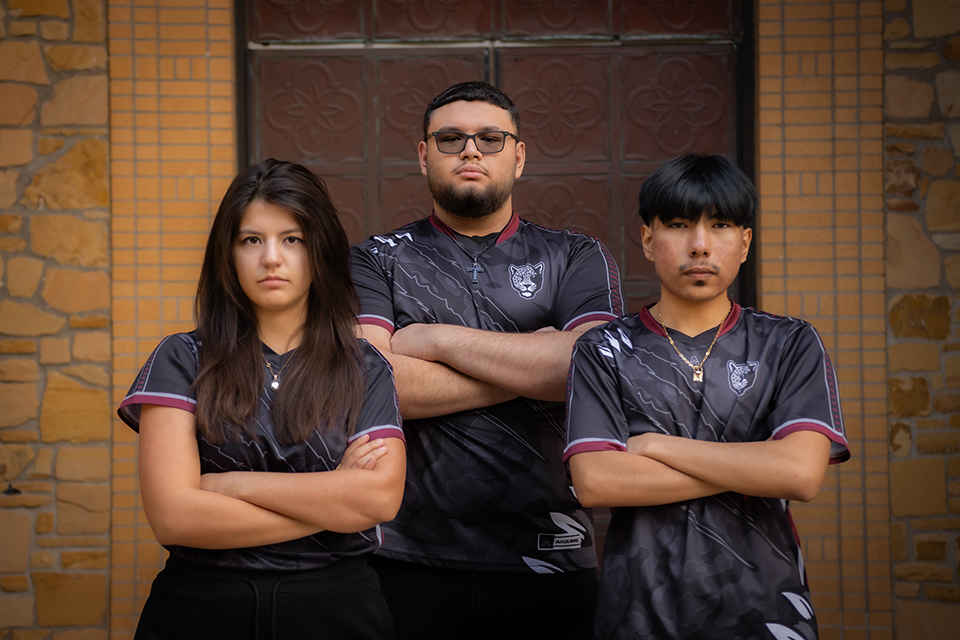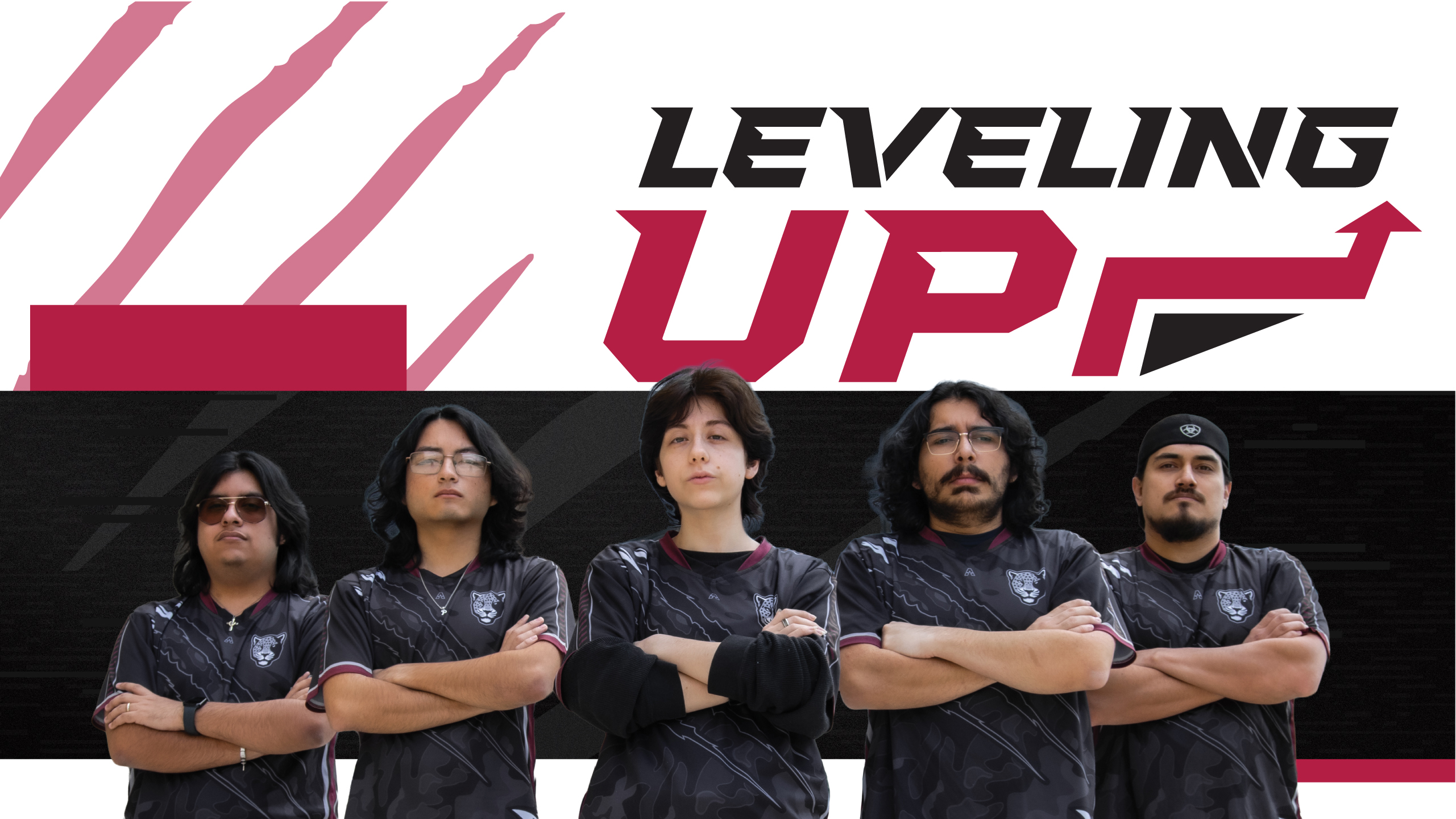Leveling Up

How the University's esports program fuels confidence, connection and career readiness
By Kevin Castro
In just a few years, Texas A&M University-San Antonio’s esports program has evolved from a modest initiative into a dynamic, career-shaping experience that redefines college gaming. Established in 2020, the program offers students hands-on experience in leadership, media production and teamwork — skills that extend far beyond the screen.
“The biggest thing is transfer of ownership,” said Aaron Jaggers, head esports coach. “We’ve built robust structures and traditions, and now it’s about giving students the reins.”
Events like fall boot camps, barbecues and team competitions provide students with opportunities to build community, take initiative and apply their skills in real-world settings. Students also learn from their mistakes and grow into roles mirroring those in professional settings.
“That supportive culture makes this program unique,” Jaggers said.
The program’s student-led structure means Jaguars are not just competitors — they’re strategists, content creators and managers. Student volunteers organize and manage meetings and events, social media campaigns and business operations efforts across seven teams, building a fully functioning ecosystem.
Hope Trinidad, a senior double-majoring in marketing and management, didn’t originally join as a gamer. Instead, she stepped in to support marketing and quickly became a key player and team leader.

"Every day I’m designing graphics, writing emails, analyzing social media data. It’s muscle memory now,” Trinidad said. “The cool part is I was able to apply those skills directly to my coursework and internships. This program gave me the space to grow into the professional I want to be.”
Sophomore Michelle Gervais, a criminal justice major, gained unique experience through the esports content team.
“I had no media experience, but now I manage video editing, graphic design and social content,” she said. “I’ve traveled with the team, gone to conventions and worked with industry pros. It’s opened doors I never expected.”
Eli Campos, a senior majoring in cybersecurity and captain of the University’s esports chess team, said being part of the program helped him come out of his shell.
“I’m more confident now talking to teammates and coaching,” he said. “Being part of this community has helped me grow in ways I didn’t expect — not just as a player, but as a leader.”
That kind of personal and professional growth is exactly what Jaggers hopes for. Success isn’t defined by the win-loss column, he stresses, but rather in the confidence students gain as they perform key functions like planning recruitment campaigns and organizing tournaments, which require many of the skills they’ll carry into the workforce.
"I'm more confident now in talking to teammates and coaching. Being part of this community has helped me grow in way I didn't expect — not just as a player, but as a leader."
~Eli Campos
“I’ve helped students advocate for themselves and navigate tough situations,” he said. “We’re teaching them how to show up for each other and for themselves.”
Jaggers said the teams are excited about upcoming events, including The Texas A&M System Showdown, which brings together players from other A&M universities to compete in games like Super Smash Bros. Ultimate and Overwatch. This past February, A&M-San Antonio Esports helped organize the largest in-person esports matchup to date among university teams. The competition was held at the Boeing Center at Tech Port and included teams representing Texas A&M campuses in College Station, Corpus Christi, Texarkana and Commerce.

Another big event is the annual National Association of Collegiate Esports (NACE) Conference, which was held in July at the University of Texas at Dallas.
“NACE is where the future of esports in higher education is happening,” Jaggers said. “Being there gives our students a chance to showcase their talents and network with the best teams in the country.”
The esports program’s community-first approach continues to draw new students as well, many of whom had never considered esports as anything more than a hobby. Gervais encourages anyone curious to take the first step.
“Just show up,” Gervais said. “It’s flexible and welcoming. You’ll find your community here. It’s like building your own family.”
The confidence students gain through esports doesn’t end with graduation. Jaggers points to alumni like Joey Murillo, one of the University’s first student employees with the esports program who served as the content crew manager and event coordinator. He was able to leverage his experience into an internship with the San Antonio Museum of Science and Technology and now works as a broadcast engineer for Nelco Media.
Another success story is Anna Deleon. She worked as an esports graduate assistant while earning her MBA at the University. After she graduated in 2022, she started as a gaming associate at the Boeing Center at Tech Port. She’s now the event manager at the state-of-the-art facility.
“At A&M-San Antonio, esports isn’t the end goal, it’s the starting point for something much bigger,” said Jaggers. “We’re not just helping students play the game. We’re helping them realize they belong in the room, behind the camera, on the stage, in the meeting. Once they see that, everything changes.”

